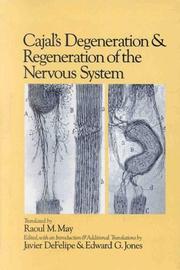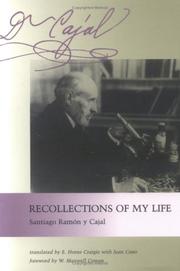| Listing 1 - 7 of 7 |
Sort by
|
Book
Year: 1935 Publisher: Madrid, Ediciones Nuestra raza
Abstract | Keywords | Export | Availability | Bookmark
 Loading...
Loading...Choose an application
- Reference Manager
- EndNote
- RefWorks (Direct export to RefWorks)

ISBN: 0195065166 9780195065169 Year: 1991 Publisher: Oxford Oxford University Press
Abstract | Keywords | Export | Availability | Bookmark
 Loading...
Loading...Choose an application
- Reference Manager
- EndNote
- RefWorks (Direct export to RefWorks)
Nervous system --- Regeneration --- Ramón y Cajal, Santiago,
Book
ISBN: 9780190221591 0190221593 Year: 2016 Publisher: New York, NY : Oxford University Press,
Abstract | Keywords | Export | Availability | Bookmark
 Loading...
Loading...Choose an application
- Reference Manager
- EndNote
- RefWorks (Direct export to RefWorks)
Histology --- Neuroanatomy. --- Histologie --- Neuroanatomie --- Technique. --- Technique --- Ramón y Cajal, Santiago, --- Castro, Fernando de,

ISBN: 026228782X 0585341281 9780262287821 9780262030182 9780585341286 0262680602 Year: 1989 Publisher: Cambridge : MIT Press,
Abstract | Keywords | Export | Availability | Bookmark
 Loading...
Loading...Choose an application
- Reference Manager
- EndNote
- RefWorks (Direct export to RefWorks)
Santiago Ramon y Cajal (1852-1934) made prolific and lasting contributions to understanding "the life of the infinitely small." Santiago Ramón y Cajal (1852-1934) made prolific and lasting contributions to understanding "the life of the infinitely small." Widely thought of as the founder of neuroscience, Cajal made remarkable explorations into the organization and function of the nervous system. His work is still referred to more than that of any other scientist in the field.W. Maxwell Cowan's foreword to this edition conveys the excitement and energy of Cajal's life and endeavors, the liveliness and flamboyance of his engagements with the microscope. Cowan surveys Cajal's salient discoveries, noting that almost every important conceptual issue in neurobiology was foreshadowed in Cajal's work: the initial description of the climbing fibers of the cerebellum, the discovery of the growth cone, the concept of the "dynamic polarity" of the neurom an anticipation of the later discovery of axonal transport, and the prediction that new synapses may be formed throughout life to serve as a physical basis for learning and memory. W. Maxwell Cowen is Vice President and Chief Scientific Officer at the Howard Hughes Medical Institute.
Anatomy --- Physicians --- Anatomists --- Human Anatomy & Physiology --- Health & Biological Sciences --- biography. --- Biography --- Ramón y Cajal, Santiago, --- Physician --- Anatomies --- Cajal, Santiago Ramón y, --- Cajal, S. R. --- Doctor Bacteria, --- Bacteria, --- Ramón y Cajal, S. --- Nervous system. --- Neuroscientists. --- NEUROSCIENCE/General --- SCIENCE, TECHNOLOGY & SOCIETY/History of Science --- Organs (Anatomy) --- Neurosciences --- Life scientists --- Ramón y Cajal, Santiago, --- Ramón Cajal, Santiago,
Book
ISBN: 1438452748 9781438452746 9781438452739 143845273X Year: 2014 Publisher: Albany
Abstract | Keywords | Export | Availability | Bookmark
 Loading...
Loading...Choose an application
- Reference Manager
- EndNote
- RefWorks (Direct export to RefWorks)
Lens, Laboratory, Landscape focuses on competing views about the power of vision in Spain between the 1830s and the 1950s. The photographic lens, laboratory microscope, "retinal vision" of philosopher José Ortega y Gasset, and the topographical studies of Manuel de Terán are woven together in and around a European cultural milieu that gave observation primacy. For once, Spain—now bereft of its empire—was not on the outside of such debates. Whether in the laboratory, family home, darkroom, art gallery, or on the road, in Cuba or Zaragoza, Madrid or Massachusetts, Spanish artists and scientists were engaged with the social and economic power of observation at a time when the speed of modern life made observing a challenge. Claudia Schaefer brings the technologies of the eye—photograph, microscope, lens, tools for land surveying—to light as markers on the nation's touted path to modernity.
Material culture --- Culture --- Folklore --- Technology --- History --- Spain --- Espagne --- Espainiako Erresuma --- España --- Espanha --- Espanja --- Espanya --- Estado Español --- Hispania --- Hiszpania --- Isupania --- Kingdom of Spain --- Regne d'Espanya --- Reiaume d'Espanha --- Reino de España --- Reino d'Espanya --- Reinu d'España --- Sefarad --- Sepharad --- Shpanie --- Shpanye --- Spanien --- Spanish State --- Supein --- イスパニア --- スペイン --- Intellectual life --- Ramón y Cajal, Santiago, --- Cajal, Santiago Ramón y, --- Cajal, S. R. --- Doctor Bacteria, --- Bacteria, --- Ramón y Cajal, S. --- Ramón Cajal, Santiago,
Book
ISBN: 1280489170 9786613584403 1846159202 1855662183 Year: 2010 Publisher: Woodbridge : Tamesis,
Abstract | Keywords | Export | Availability | Bookmark
 Loading...
Loading...Choose an application
- Reference Manager
- EndNote
- RefWorks (Direct export to RefWorks)
Una definición cultural más comprensiva del nacionalismo español. Médicos escritores en España, 1885-1955 estudia las representaciones metafóricas de la enfermedad en Santiago Ramón y Cajal [1852-1934], Pío Baroja [1872-1956], Gregorio Marañón [1887-1960] y Antonio Vallejo Nâ0]. Por 'médicos escritores' el autor entiende aquéllos que intervinieron en la política española usando teorías científicas para construir discursos raciales, sexuales y patológicos sobre la identidad nacional. Estanaliza el papel de estos cuatro médicos en una variedad de textos, ilustrando cómo utilizan la ciencia y la medicina para definir políticas nacionales en España a través de la metáfora del cuerpo enfermo. Teniendo en considón psicoanálisis, teorías postcoloniales, de género y 'queer', este libro expone una definición negativa de la nación española que aplica conceptos patológicos para desacreditar y rechazar todo aquello que no encajaastellanocentrista de la españolidad. ALFREDO J. SOSA-VELASCO es Assistant Professor of Spanish and John Wesley and Anna Hodgin Hanes Fellow en el Departamento de Lenguas y Literaturas Románicas de la Universidad de Carolina del Norte en Chapel Hill.
Medical literature --- History and criticism. --- Ramón y Cajal, Santiago, --- Baroja, Pío, --- Marañón, Gregorio, --- Vallejo Nágera, Antonio, --- Life sciences literature --- Medicine --- Nágera, Antonio Vallejo, --- Marañón, Gregorio. --- Marañón, G. --- Marañón y Posadillo, Gregorio --- Posadillo, Gregorio Marañón y --- Baroja y Nessi, Pío --- Cajal, Santiago Ramón y, --- Cajal, S. R. --- Doctor Bacteria, --- Bacteria, --- Ramón y Cajal, S. --- Ramón Cajal, Santiago, --- Baroja, Pío --- Nessi, Pío Baroja y, --- Baroja Nessi, Pío, --- Baroja y Nessi, Pío, --- Nessi, Pío Baroja, --- 巴羅哈, --- Ramon y Cajal, Santiago, --- Baroja, Pio, --- Maranon, Gregorio, --- Vallejo Nagera, Antonio,
Book
ISBN: 1489982892 0387927077 9786612287831 1282287834 0387927085 Year: 2009 Publisher: Dordrecht ; New York, NY : Springer-Verlag,
Abstract | Keywords | Export | Availability | Bookmark
 Loading...
Loading...Choose an application
- Reference Manager
- EndNote
- RefWorks (Direct export to RefWorks)
Over the last few years, a considerable number of different cell adhesion molecules (CAMs) have been identified that are imperative for synapse formation and maintenance. Recent research, however, has also revealed that many synaptic connections are highly dynamic and not as stable as initially thought. A delicate balance between adhesive and anti-adhesive events at the synapse suggests that CAM functions are highly regulated. Dr. Michael Hortsch and Dr. Hisashi Umemori's The Sticky Synapse: Cell Adhesion Molecules and Their Role in Synapse Formation and Maintenance presents the first comprehensive synopsis on how adhesive proteins contribute to synapse formation, function, and remodeling. Topics discussed range from general synaptic processes, such as neuromuscular junction and CNS synapse formation, to CAM-specific chapters on Cadherins, Ig-domain CAMs, Neuroligins, extracellular matrix molecules, Connexins and many others, and how these CAM families contribute specifically to synaptic functionality. The wide range of general and technical information offered in this book will appeal to students, researchers, and clinicians in the fields of molecular and cellular neuroscience, neurophysiology, and developmental neurobiology. . About the editors: Dr. Michael Hortsch holds a Diploma degree in Biochemistry from the Free University Berlin and a Ph.D. in Biology from the University of Heidelberg in Germany.While working at theWeizmann Institute in Israel, the European Molecular Biology Laboratory in Heidelberg, and at the University of California at Berkeley he has published on topics such as the mechanism of growth factor receptor activation, the transport of proteins across membranes, and the physiological roles of neuronal cell adhesion molecules during nervous system development. He has been a faculty member of the Department of Cell and Developmental Biology at the University of Michigan in Ann Arbor since 1991. Dr. Hortsch has served on scientific review panels for the National Institutes of Health, the National Science Foundation, and other agencies. Dr. Hisashi Umemori is a faculty member of the Molecular and Behavioral Neuroscience Institute and of the Department of Biological Chemistry at the University of Michigan Medical School. He worked with Dr. Tadashi Yamamoto at the Institute of Medical Sciences of the University of Tokyo and analyzed intracellular signaling mechanisms that are involved in myelination and in learning and memory.While working with Dr. Joshua R. Sanes atWashington University Medical School and at Harvard University, he identified synaptic organizing molecules that promote synapse formation during nervous system development. Currently, his laboratory is working to uncover the molecular mechanisms that govern the formation of functional neural circuits in the brain. Dr. Umemori has received various awards, including a Basil O'Connor Award and a Klingenstein Fellowship Award. .
Cell adhesion molecules. --- Synapses. --- Synapses --- Cell adhesion molecules --- Cell Adhesion Molecules --- Cell Adhesion --- Cell Physiological Processes --- Intercellular Junctions --- Nervous System --- Membrane Glycoproteins --- Antigens, Surface --- Glycoproteins --- Membrane Proteins --- Cell Physiological Phenomena --- Cell Membrane Structures --- Antigens --- Anatomy --- Phenomena and Processes --- Proteins --- Biological Factors --- Cell Membrane --- Amino Acids, Peptides, and Proteins --- Cellular Structures --- Chemicals and Drugs --- Cells --- Neuroscience --- Neurology --- Human Anatomy & Physiology --- Medicine --- Health & Biological Sciences --- Neuroplasticity. --- Neurotrophic functions. --- Physiological effect. --- Golgi, Camillo, --- Ramón y Cajal, Santiago, --- Nervous system plasticity --- Neural adaptation --- Neural plasticity --- Neuronal adaptation --- Neuronal plasticity --- Plasticity, Nervous system --- Soft-wired nervous system --- Synaptic plasticity --- Adhesion molecules (Cytology) --- Adhesion substances (Cytology) --- Cell adhesion substances --- Intercellular adhesion molecules --- Morphoregulatory molecules --- Cajal, Santiago Ramón y, --- Cajal, S. R. --- Doctor Bacteria, --- Bacteria, --- Ramón y Cajal, S. --- Medicine. --- Neurosciences. --- Neurology. --- Cell biology. --- Developmental biology. --- Neurobiology. --- Biomedicine. --- Developmental Biology. --- Cell Biology. --- Neurophysiology --- Adaptation (Physiology) --- Developmental neurobiology --- Biomolecules --- Desmosomes --- Hemidesmosomes --- Nerve endings --- Nerves --- Neural circuitry --- Neural transmission --- Synaptosomes --- Cytology. --- Cell biology --- Cellular biology --- Biology --- Cytologists --- Development (Biology) --- Growth --- Ontogeny --- Nervous system --- Neuropsychiatry --- Neurosciences --- Neural sciences --- Neurological sciences --- Medical sciences --- Diseases --- Neurology . --- Ramon y Cajal, Santiago,
| Listing 1 - 7 of 7 |
Sort by
|

 Search
Search Feedback
Feedback About UniCat
About UniCat  Help
Help News
News